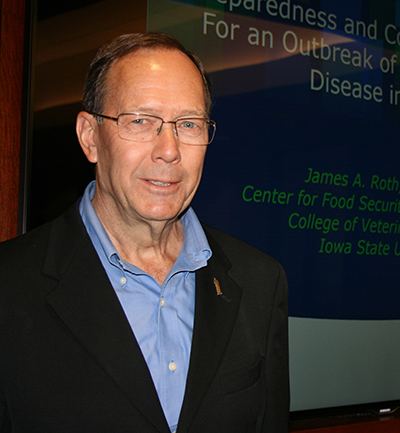
Jim Roth
Stange Award for Meritorious Service
In his acceptance speech for the Stange Award, Dr. Jim Roth pointed out he is a member of the Class of 1975 or as he termed it “the famous class of 1975.”
No less than five members of the class of ’75 have been either awarded the Stange Award or the Switzer Award by the College of Veterinary Medicine.
Roth’s selection as a recipient of the Stange Award for Meritorious Service is number six.
But it isn’t just his fellow classmates who have received the college’s highest alumni honor.
“I have a lot of mentors who have received this award,” Roth said. “I have known most of the Stange awardees and that is why I’m so honored to receive this award.”
Roth’s inclusion in this exclusive club is overdue. A three-time graduate of the college (DVM ’75, MS ’79 and a PhD in immunology ’81), Roth holds more titles and has received more awards than the average Iowa State alumnus.
He’s a Clarence Hartley Covault Distinguished Professor in Veterinary Medicine at Iowa State. He holds the Presidential Chair in Veterinary Microbiology and Preventive Medicine. In 2002, Roth established the Center Food Security and Public Health (CFSPH), of which he continues to serve as the director. And he is the executive director of the Institute for International Cooperation in Animal Biologics (IICAB).
He has devoted his career to Iowa State, spending 45 years on the College of Veterinary Medicine faculty.
“If you want a career in animal health, there is no better place to do that than Iowa State and Ames,” Roth said.
Most of his classmates from the “famous class of 1975” probably stayed on one career path trajectory. That wasn’t in the cards for Roth.
“I’ve had at least three transitions after returning from private practice to join the faculty,” he said. “I started out as a classroom instructor and basic immunology researcher, then gradually began to emphasize infectious disease prevention. Today I devote most of my time to the mission of the CFSPH – to increase national and international preparedness for accidental or intentional introduction of diseases that threaten food production or public health. Science changes so fast, you need to change with it and try to stay ahead of the game. I’ve kept my career fresh by moving into different areas.”
With the development of the Veterinary Biologics Training Program in 1995, Roth and his team have provided an educational program covering the USDA process for approving vaccines and diagnostics.
Working with the USDA Center for Veterinary Biologics in Ames, this annual program has had more than 3,000 participants, including more than 875 international attendees from 96 countries.
He currently focuses on secure food supply projects while also working with state and federal officials and industry in planning for optimal responses to transboundary and emerging diseases that threaten the food supply or public health.
Roth has testified before Congress on biosecurity preparedness, on efforts to address bioterrorism and agroterrorism, and on the need for vaccines for foreign animal diseases.
All of which has led him to be recognized by several different organizations. He is a fellow of the American Association for the Advancement of Science and in 2016 was named to the National Academy of Medicine.
Other awards include the Distinguished Veterinary Immunologist Award from the American Association of Veterinary Immunologists, Public Service Award from the American Veterinary Medical Association, the Senator John Melcher Leadership in Public Policy Award from the American Association of Veterinary Medical Colleges, and the USDA APHIS Administrator’s Award for lifetime achievements in animal health.
“I have a lot of history here, but everything I’ve accomplished has been a team effort,” Roth said. “If it was just what I’ve accomplished, I wouldn’t be getting these awards. The CFSPH and IICAB staff members are a dedicated and talented group. They do exceptional work and bring honor to me, the College of Veterinary Medicine, and the whole university.”
